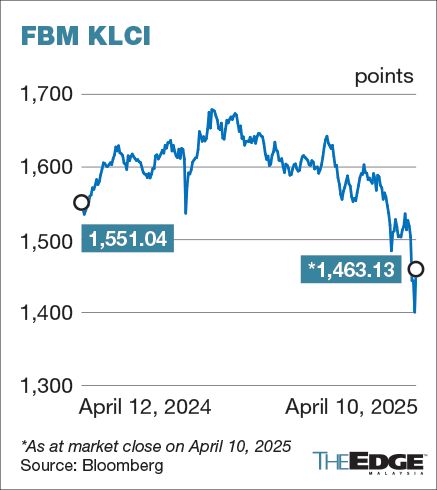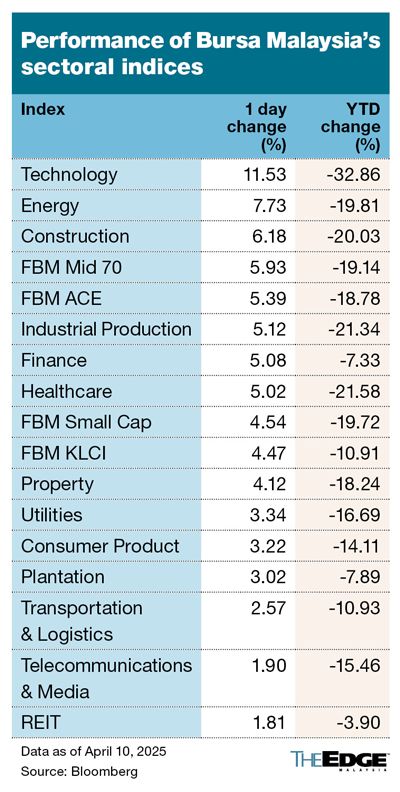
KUALA LUMPUR (April 10): Bursa Malaysia staged a strong rebound on Thursday, mirroring the global market rally after US President Donald Trump announced a 90-day pause on the reciprocal tariffs, mere hours after they had taken effect on Wednesday.
The rebound added some RM73.28 billion to the total market capitalisation of Bursa Malaysia’s securities — though still less than the RM93.15 billion lost on Monday alone when tariff fears roiled markets. Asian markets gained between 4% to 9%, as investors breathed a sigh of relief.
The FBM KLCI opened strongly, surging 63.71 points or 4.54% to 1,464.30 and reaching an intraday high of 1,473.36. By the end of the day, the benchmark index settled at 1,463.13, up 62.54 points or 4.47% — its largest single-day gain since March 20, 2020.
As all 30 component stocks closed in positive territory, as the FBM KLCI gained a combined market capitalisation of RM41.38 billion. Leading the charge were CIMB Group Holdings Bhd (KL:CIMB), with an impressive 8.8% jump to RM6.91, Gamuda Bhd (KL:GAMUDA), which rose 7.24% to RM3.85, and Nestlé Malaysia Bhd (KL:NESTLE), which climed 7.14% to RM78.98.
Gains extended all the way to smaller-cap stocks, as seen in the 4.54% advance in the FBM Small Cap Index and the 5.39% increase in the FBM ACE Index.
All sectors remained in positive territory, with the Bursa Malaysia Technology Index leading the way, surging 11.53%. The Energy Index followed with a 7.73% gain, while the Construction Index rose 6.18%.
The ringgit appreciated by 0.59%, rising to 4.4698 against the US dollar from 4.4963 on Wednesday.
Analysts have turned more optimistic after Trump’s tariff backtrack, viewing this as a potential catalyst for a sustained recovery in global markets, at least in the short term.
Kenneth Leong, head of research at Apex Securities who previously advised investors to wait and see, now believes that any favourable development during the 90-day negotiation period that the US offered to its trading partners could reinforce market recovery in the near term.
However, Trump's unpredictable economic policies necessitate continued investor caution, he warned.
This sentiment was echoed by Tradeview Research senior analyst Tan Jia Hui. While Tan thinks the current market presents opportunities to buy stocks with strong fundamentals — particularly those less dependent on the export market — preserving cash remains essential amid ongoing uncertainty.
Meanwhile, Loui Low, head of research at Malacca Securities, voiced his confidence in Malaysia, stating, "At least we have a team meeting Trump next week." He believes Malaysia is unlikely to be a primary target for US, as the nation remains firmly engaged in ongoing negotiations.
There may be an unexpected twist during the 90-day pause period, with Asean potentially emerging as a net beneficiary, he added.
Low stressed that domestic themes — such as the ongoing National Energy Transition Roadmap (NETR), the New Industrial Master Plan (NIMP) and the expansion of data centre developments — will remain key drivers of Malaysia’s economic growth.
Apex’s Leong favours the renewable energy (RE) sector, which has minimal exposure to reciprocal tariff implementation and is largely supported by local government-led policies.
Among their top RE picks were Samaiden Group Bhd (KL:SAMAIDEN), Pekat Group Bhd (KL:PEKAT), MN Holdings Bhd (KL:MNHLDG) and Southern Cable Group Bhd (KL:SCGBHD).
For investors seeking a more defensive strategy, Low suggested banking stocks such as CIMB, Malayan Banking Bhd (KL:MAYBANK) and RHB Bank Bhd (KL:RHBBANK), as well as utilities like Time Dotcom Bhd (KL:TIMECOM) and Tenaga Nasional Bhd (KL:TENAGA).
Tech's valuation points to 'prime bottom-fishing opportunity'
Rakuten Trade's head of equity sales Vincent Lau, however, sees the technology sector — which has suffered the steepest decline this year, with the Technology Index down 32.86% — as a prime opportunity for bottom-fishing as its valuations now are more compelling than other industries. This, he said, presents an attractive entry point for investors.
"Despite hurdles like supply constraints and the risk of US government blacklisting, which could restrict semiconductor chip manufacturing, the sector still holds potential," Lau said.
If the exemption remains in place, with chip demand staying resilient, and no one getting blacklisted, Lau believes the technology space could present a compelling opportunity.
To receive CEO Morning Brief please click here.
- Appellate court directs full trial for 10 purchasers of SkyPark @ Cyberjaya over partial CCC
- Former Petronas manager charged with disclosure of confidential information
- Malaysia Airlines to resume direct flights to Brisbane after two-year hiatus
- EcoWorld, SD Guthrie, NS Corp ink deal for joint venture to advance N Sembilan’s RM2.95b industrial park
- Malaysia's economic growth likely slowed in 1Q, official flash estimates show
- Trump studying whether to fire Fed chair Powell, adviser says
- White House seeks to bring financial regulators under its sway
- Capital One deal for Discover wins approval from US regulators
- Trump releases files on 1968 assassination of Robert F Kennedy
- China speeds up budget spending to counter tariff woes


